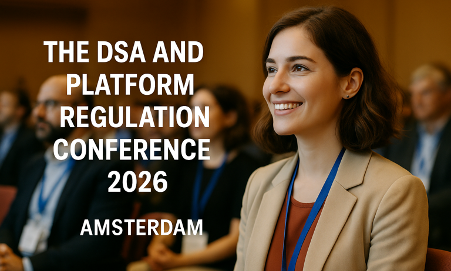As the Digital Services Act (DSA) nears its second anniversary of full applicability across the EU, the DSA Observatory at the University of Amsterdam is organizing its second international conference on ‘The DSA and Platform Regulation’, set to take place on 16–17 February 2026 at the Amsterdam Law School.
This event offers a vital platform to evaluate the DSA’s effectiveness in shaping European and global platform regulation, particularly within its broader legal and political contexts. The overarching theme for the 2026 conference is platform governance and democracy.
Evolving From Law to Practice
Over the past two years, the DSA has transitioned from legal ambition to enforcement reality:
- The European Commission has initiated proceedings against several Very Large Online Platforms and Search Engines (VLOPs/SEs).
- National regulators are asserting their authority.
- Platforms have begun publishing transparency disclosures including systemic risk assessments and audit reports.
- Delegated acts and Codes of Conduct have been incorporated to strengthen the regulatory framework.
- Efforts have begun (albeit unevenly) to operationalize researcher access and user redress mechanisms.
These steps represent the formation of a more complex accountability ecosystem, involving a wide array of actors such as auditors, civil society organizations, fact-checkers, and dispute settlement bodies.
Conference Themes and Call for Abstracts
The organizing committee invites abstracts between 500–800 words from a wide range of disciplines and professional backgrounds. Key themes include:
- Systemic Risk Regulation: How platforms identify, assess, and mitigate risks—particularly those tied to fundamental rights, disinformation, elections, and youth mental health.
- Transparency Architecture: Evaluating platform reporting obligations, algorithmic disclosures, audit practices, and researcher access to data.
- Co-regulatory Tools: Effectiveness of codes of conduct addressing disinformation and hate speech, and how crisis protocols function.
- Enforcement Politics: Selection and scope of investigations, and the interplay between EU institutions, member states, and civil society.
- Age Verification and Adult Content: Balancing child protection with privacy rights.
- Contested Speech in War and Genocide: Platform moderation policies around sensitive geopolitical conflicts (e.g., Ukraine, Palestine).
- User Rights and Access to Justice: Functionality of notice-and-action systems and out-of-court redress mechanisms.
- Legal Intersections: How the DSA interacts with the DMA, AI Act, GDPR, European Media Freedom Act, and others.
- New Accountability Actors: Emergence of vetted researchers, strategic litigants, and trusted flaggers.
- Regulation of Non-VLOP/SEs: How the DSA is being implemented across smaller platforms.
- Geopolitical Dimensions: How global platform resistance and the “Brussels effect” shape enforcement beyond the EU.
Important Dates and Submission Details
- Abstract Deadline: 30 September 2025 (23:59 CEST)
- Notification of Acceptance: 31 October 2025
- Conference Dates: 16–17 February 2026
Selected presenters will be invited to deliver 15-minute talks. While full papers are encouraged, they are not mandatory. Panel participation may also be offered to some contributors.
Registration and Venue
- Registration Opens: December 2025
- Venue: Amsterdam Law School, Nieuwe Achtergracht 166, 1018 WV Amsterdam
- Note: Participants must cover their own travel and accommodation expenses.
(The information shared here is sourced from official websites and has been reviewed by Media Research for relevance and authenticity. However, we advise caution, as there may still be potential risks. Please avoid sharing any sensitive personal information when applying. The Image is AI generated)
Media Research offers comprehensive research consultation tailored to your needs. Book your appointment now using the form or email at contact@mediaresearch.co.in















Leave a Reply